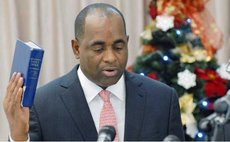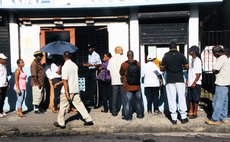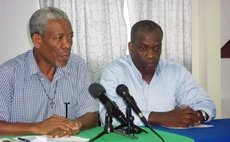The Campaign's on for Most Important Elections since Independence
Almost everyone agrees with the view that the 2015 general election, the eighth since Independence, will be one of the most closely fought contests. Although Prime Minister Roosevelt Skerrit has predicted a landslide for his ruling Dominica Labour Party (DLP) indications are the DLP will have a difficult time holding on to the majority of the seats that it won in 2009. Our opinion is based on the fact that the election of Lennox Linton as the political leader of the United Workers Party (UWP) has reenergised that party to the point that it could seriously challenge the DLP at the polls in 2015 or earlier.
Recall that a number of candidates won narrowly in 2009. For example, Petter St. Jean, the DLP candidate for Laplaine defeated Ron Green by just two votes (724 to722); in the Morne Jaune/ Riviere Cyrique constituency only five votes separated Ivor Stephenson (the winner) who ran for the DLP from Abraham Browne, of the UWP. In the Roseau Valley, Norris Charles of the UWP was defeated by Dr. Colin McIntyre by 278 votes and in Wesley, Gloria Shillingford defeated Ezekiel Bazil by just 75 votes. There are many other constituencies where the mix of candidate and other factors make the outcome very unpredictable. The point is, it is anyone's guess which party will form the next government and many politicians and their supporters will become nervous wrecks as Election Day draws nearer.
Nevertheless, the electorate has to decide whether it should re-elect the DLP on the strength of its performance over the past 15 years or vote in the UWP with the hope that this party will do a better job. But voters must be careful.
Almost everyone repeats the cliché, at one point or another – a promise is comfort to a fool. Yet many forget this wise statement as the politicians on both sides of the political spectrum become increasingly outrageous with promises that often transcend reality.
We have been hearing these wonderful plans on the political platform and in the press for the past few months. And as the political climate becomes stormier and stormier so too will the promises become wilder and wilder and if they are repeated often enough some of us will begin to believe them.
That is in spite of the fact that for decades Dominica has been pummeled by broken promise after broken promise, failed projects, economic disasters and excuses pilled upon excuses which, to say the least, insults the intelligence of the electorate. Hence, many voters wonder whether it makes much sense to vote at all. The numbers of undecided voters are become larger and larger as people get more and more disillusioned with party politics. But we are told that abstention at the polling booth provides lop-sided representation and that a well-balanced parliament makes for better decisions for the overall good of the country.
Although the manifestos of the two major political parties have not been publicized, we should not expect many surprises when we do obtain copies. Apart from the time-frame in which Dominica build an international airport, the major plans and programmes of the political parties are the same. It has to be because there are so few options available for the development of Dominica. What will separate the two parties is the quality of the candidates and how successful they will be in simplifying their plans and programmes to the electorate as well as the public's perception of the level of corruption now afflicting the ruling party.
So as the parties prepare to release their manifestos, we urge them, if that is possible at this late stage, to inject a fair dose of realism into the plans that they will present. It is our view that Dominica does not need any more plans; what we need is the resources and the political will and determination to implement those that already exist.
The fact is whoever wins the next general election will face serious challenges as that party moves to repair the severely damage economy. And to paraphrase a statement by a leading opposition politician: the government, whether UWP or DLP, will need the support of most of the people to be able to implement tough policies if the economic fortunes of this country is going to swing towards prosperity.
In addition, those of us who are old enough to have experienced several general election campaigns know that the gulf between campaign promises and the reality of day-today governance is as wide as the Caribbean Sea.
We are also familiar with the statements of many prime ministers just after they were elected to office; they all say that the previous administration mismanaged the economy, left the treasury empty and hence their elaborately crafted economic and social development plans must be placed on the back burner.
Nevertheless, it is up to the electorate, through civil society and the press, to put the matter of accountability at the top of the election agenda. Politicians who are prone to wild and wonderful promises must understand that the public will eventually hold them accountable. Dominicans should accept no more excuses.



